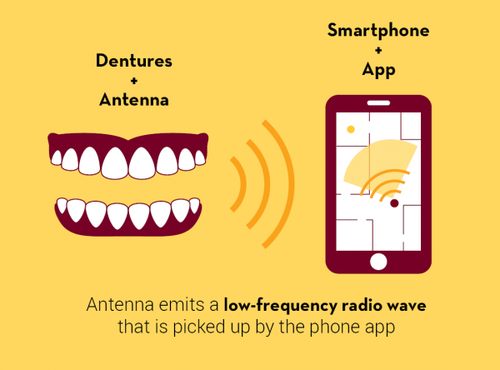Collaboration between aerospace engineering and dentistry develops new dental devices for the elderly

30 years ago, Stephen Shuman, D.D.S., M.S., never would have imagined he’d be working with aerospace engineers on oral health issues. Now, the associate professor in the School of Dentistry works with them on a regular basis. He’s collaborating with a local aerospace research company, ASTER Labs, to create new dental devices to help the elderly maintain their oral health and function.
ASTER Labs didn’t start out in the dentistry but ended up there over the course of time. With cuts in space funding, ASTER Labs considered other sectors to implement their technology and settled on health care. They first worked on an automated toenail clipper aimed for seniors, a project revealing more unmet needs of the aging population. ASTER approached Shuman to expand the focus into other areas.
A specialist in geriatric dentistry for over 30 years, Shuman is well versed of the recurrent problems faced by seniors as well as the rising interest in how to support older or disabled adults.
Right now, Shuman and ASTER Labs are working on two major dental devices projects: a denture-locator system and an automated tooth-brushing system.
Denture-locator System
“One of the most frequent problems we see among older adults in long-term care settings is lost dentures,” Shuman said. “Dentures are misplaced regularly, maybe lost in the sheets or wrapped up in napkins on meal trays and tossed away.”
He noted this problem is even more prevalent among cognitively-impaired seniors who are more prone to forget items. The loss of dentures is both emotionally and financially draining – a set of complete dentures can cost about $3,000 or even more.
The team is using ASTER’s GPS expertise to create a small, passive antenna to place inside a denture.
“If a GPS system can tell me that my car is close to an upcoming turn, why can’t it find a lost denture in a nursing home?” Shuman said.
The system would employ a cellphone app to activate the antenna and locate the lost dentures. This app could be used by caregivers, nursing home staff or others. It could also be applied to other items in the future.
“This technology would also be especially helpful for hearing aids, which are smaller than dentures and also quite costly to replace when lost,” he said.
Automated Toothbrush
Another common issue with the elderly is maintaining good daily oral hygiene.
“As people grow older, disabilities can make it harder to properly use a hand-held toothbrush and visit the dental office regularly,” Shuman said.
With this problem in mind, Shuman and his colleagues are developing an insertable mouthpiece with automated bristles for cleaning the teeth. A prototype is in the works, which will be tested and reviewed by older adults and caregivers before moving on to a clinical trials phase.
“The key is making this a long-lasting device that can help seniors maintain their independence,” he said.
- Categories:
- Health




